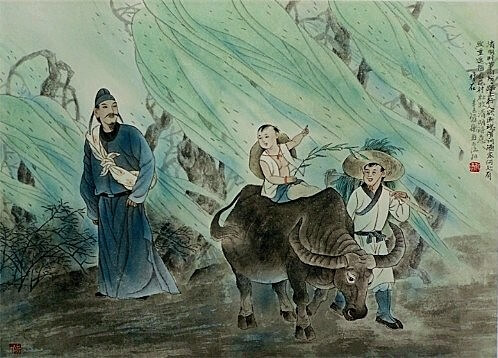Pure Brightness Festival
- Poetry of Du Mu

At the time of the Pure Brightness festival, the rain is swirling round,
On the road, the spirit of the traveler is almost broken.
He politely asks at what place an inn can be found?
A shepherd boy points far away to apricot blossom village.
The Pure Brightness Festival, also known as the Qingming Festival, is a traditional Chinese festival that takes place on the 104th day after the winter solstice. This means it usually falls on April 4th or 5th.
Setting the scenery with heavy raindrops, which are typically symbols of nature’s tears, Du Mu paints a picture of a gloomy, overcast day. Although there are many pedestrians walking down the roads, they all appear ghostly and lifeless; instead of being vitalized through one another’s presence, these people only feel that their energy is sucked out of them. The third line appears to be a rhetorical question; however, the author of the poem is actually asking a passerby, who happens to be a young shepherd boy, where the wine shop is. Although the reason behind why he asks for the location of the wine shop is unknown, it can be inferred that he wants to drown away his sad memories of the past and live in a suspended state of forgetfulness as a way of celebrating this holiday. As a response, the boy raises his finger and points to Xinghua Village, a village which has now come to symbolize a place of refuge due to the prominence of Du Mu’s poem.
清明时节雨纷纷,路上行人欲断魂。
借问酒家何处有?牧童遥指杏花村。
- Why Chinese poems is so special?
- The most distinctive features of Chinese poetry are: concision- many poems are only four lines, and few are much longer than eight; ambiguity- number, tense and parts of speech are often undetermined, creating particularly rich interpretative possibilities; and structure- most poems follow quite strict formal patterns which have beauty in themselves as well as highlighting meaningful contrasts.
- How to read a Chinese poem?
- Like an English poem, but more so. Everything is there for a reason, so try to find that reason. Think about all the possible connotations, and be aware of the different possibilities of number and tense. Look for contrasts: within lines, between the lines of each couplet and between successive couplets. Above all, don't worry about what the poet meant- find your meaning.